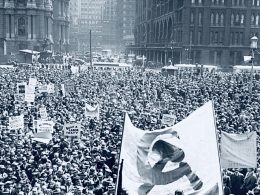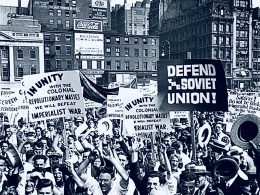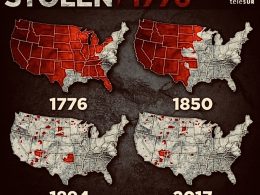The big idea which Chairman Omali and his organization the African People’s Socialist Party are promoting is that U.S. imperialism doesn’t only exist abroad; it’s also internal, directed at the groups within U.S. borders that are subjected to colonial exploitation. According to the APSP’s commentary on the recent attacks against it, that the party puts such emphasis on this idea is the reason why the state has raided its headquarters and indicted three of its members. Which indicates that the anti-colonial aspect of Uhuru’s perspective is something which communists here need to study, and take into account while navigating our situation.
Not everyone needs to embrace each part of Uhuru’s ideas, as CPI’s collaborations with Uhuru have shown it’s possible for patriotic socialists to have a relationship with communists of Uhuru’s tendency. The idea of Uhuru’s that I emphasize as important for everyone to keep in their minds—and that CPI’s ideological leader Caleb Maupin has shares, whatever theoretical differences he has with Uhuru—is the idea that the struggle of the peoples in this country who’ve been colonized represents a crucial part of our class struggle.
This is a fundamental reality of our conditions that’s self-evidently grasped by everyone who Uhuru works with, as those who speak for Uhuru have in effect stated that their criteria for partnership is a shared desire to combat our colonial institutions. That these groups have been able to unify on that basis is an extremely positive development, one which has hindered the efforts of our ruling class to divide the anti-imperialist movement. Those who’ve joined with Uhuru have already internalized the piece of anti-colonial consciousness which has led the org to come to all of its conclusions, even if not all of Uhuru’s collaborators have come to the same conclusions. The important thing is that we’ve been able to come together into a united front against U.S. hegemony, which has made the American communist movement much better able to challenge the state.
What’s going to inevitably come from this success of ours, though, is a campaign by the state to destroy us, which has naturally begun with the attempt to prosecute Uhuru. And in our task of overcoming this repression, a crucial thing for us to do is to take guidance from Uhuru’s theory. Because Uhuru, by emphasizing the reality of internal imperialism within our society, has identified an aspect of the American state’s counterrevolutionary warfare that we must take seriously.
That’s the aspect of counterrevolutionary activity where within the imperialist countries—and especially within an imperialist country which takes resources from indigenous nations it occupies—the ruling class is able to use its colonial extractive powers to make revolution more difficult. Because the bourgeoisie here have the extra strength within their capital which gets afforded via external and internal imperialism, they can make the capitalist power structure too strong for a peaceful transition towards socialism to be possible.
The most effective communists in U.S. history, such as William Foster, have argued that such a type of transition could happen; but the reality of our conditions is that the state we live under has the potential to carry out an equivalent of the anti-communist purge which took place under Indonesia’s military dictatorship. Except here, the purge would be backed by a capitalist state that’s even stronger; because it’s going to be able to keep extracting colonial wealth from the peoples it’s colonized internally, a dynamic of exploitation that will continue for as long as revolution is delayed.
Organizationally, the solution that Uhuru offers to this is to unify the white proletarians with the liberation efforts of the Native and African movements. An important thing for whites like us to understand in order to participate in this struggle is that the threat we’re confronting is more than simply a fascist one; as the party says, it’s also a colonial one, with fascism only being one of the forces that’s come about as a consequence of colonialism:
For the first time in history, there is a real possibility for genuine international class struggle, especially inside the United States. APSC lays the basis for how white people can be engaged in class struggle. Usually when people talk about class struggle, they are referring to the contest that is being made by white people for greater access to the colonial booty from the looting of the colonized. Even the struggle against what they call “fascism” is about a debate between different sectors of the white population, about the inability to access and control the colonial resources. That’s a struggle among the colonizers themselves. What the Party has done in creating the solidarity movement is give the colonizers an opportunity to break from colonialism–just like the attempt by the Russian Revolution in 1917. They can join the anti-colonial revolution, the anti-imperialist revolution of the world. This is what allowed Russia to break free from the traditional colonial process.
When we grasp this, we can get a sense of all the tasks that are entailed within our mission of overthrowing the capitalist state. Not just the organizational tasks, or the ones involving the narrative war; but also the ones we’ll be prompted to fulfill when we’ve gotten successful enough at building the movement, and at changing mass consciousness, for the state to start attacking us without restraint. Fascism, the practice where finance capital wages war against the forces of progress, is already a normal part of our liberal “democracy”; we’re headed for something worse than fascism. For a liberal totalitarianism where the imperial state effectively gets rid of the courts and the constitution so that it can extrajudicially eliminate its domestic targets, like how it does abroad through its drones.
The way this dystopian policy model can be made tenable is by taking advantage of the settler-colonial element of capitalism in the USA. Why has the U.S. empire been able to unite so many of the conservatives who’ve opposed Ukraine aid behind the effort to aid “Israel?” Because these kinds of conservatives have an interest in defending the colonial order on this continent, of which the Zionist state is an extension. They have such a strong material incentive to defend colonialism because though they don’t represent the dominant side of the ruling class—that being finance capital—they do represent industrial capital. The side whose elements within mining, ranching, and the other parts of the lower levels of capital are dependent on continuing the extraction from indigenous territories. It’s in their interests to support the genocide against Gaza, because whether Gaza becomes liberated directly relates to whether the colonized Africans and Natives in the core become liberated.
Though these rightists are apathetic when it comes to the project at destabilizing Russia, they have good reason to care about defending colonialism. Especially colonialism in its form of primitive accumulation, which Israel’s land and resource theft exemplifies. As long as an anti-revolutionary effort involves maintaining the means for primitive accumulation which the lower levels of capital depend on, we can expect many conservatives to choose the wrong side of history, even when they take the right side in regard to the new cold war.
This doesn’t mean their opposition to the new cold war’s anti-Russian aspect hasn’t hurt the empire; or that there aren’t also many right-leaning people who’ve shown themselves to be principled on anti-imperialism. The lesson we need to take from this last month’s pro-Zionist doubling down by so many on the right, though, is that colonialism can’t be underestimated as a threat towards the revolutionary cause. In a country where colonial extraction from both without and within remains integral to the functionings of capital, colonialism’s influence is insidious. It can unify the competing elements of capital during crucial moments, getting the right opportunists to betray the anti-imperialist cause and assist in the empire’s most barbaric campaigns of violence.
So Israel has shown us the extent of the threat we face; now what? The thing we need to do now is keep working to build alliances between all the elements which have proven themselves to be reliable friends to the anti-imperialist cause. These people who communists of Uhuru’s tendency can trust include patriotic socialists, as well as libertarians; this has been proven by the formation of the united front between these groups, which have all recognized unity to be essential in the midst of our government’s maneuvers towards world war.
The members of this front are going to continue building the movement, and when we become successful enough at this, the state will intensify its efforts to suppress us. When this escalation in the struggle comes, we will be able to continue weakening the state’s control; but that will only be possible if we’ve already made ourselves prepared to fight against a state which can take advantage of its internalized colonial extraction. The state has the ability to assail us with counter-gangs that are aligned both with finance capital, and with industrial capital; our enemies include both radical liberals who’ve formed into ultraviolent groups (like the “Antifa” anarchist clubs) that view communists as fascists, and right-wing anti-communists who’ve formed into fascist militias.
During the moment when all these forces are activated, we’re going to be able to win by allying with all the elements of American society which oppose the violent anti-communist agenda of these reactionaries. Especially in the rural areas, there are plenty of libertarians who won’t be willing to support liberal totalitarianism’s attempt at purging dissent; and should groups like Uhuru become successful enough, in the urban areas there will be great masses of people whose efforts at revolt are guided by reliable sources of revolutionary leadership.
The vast majority of the people in these urban areas lack the petty-bourgeois interests that lead so many of today’s self-described communists to embrace radical liberalism; and Uhuru has been managing to bring a growing number of these working-class people into the struggle. The Party of Communists USA is another source of hope for building a mass proletarian base, as it’s established a substantial union presence. And CPI is expanding its own connections to ordinary people, with its leaders planning to transition towards a fully in-real-life mode of organizing once the org becomes strong enough. There’s an increasing amount of hope for our cause, and it’s our job to commit to this path which the struggle’s recent developments have created for us.
————————————————————————
If you appreciate my work, I hope you become a one-time or regular donor to my Patreon account. Like most of us, I’m feeling the economic pressures amid late-stage capitalism, and I need money to keep fighting for a new system that works for all of us. Go to my Patreon here.
To keep this platform effective amid the censorship against dissenting voices, join my Telegram channel.








